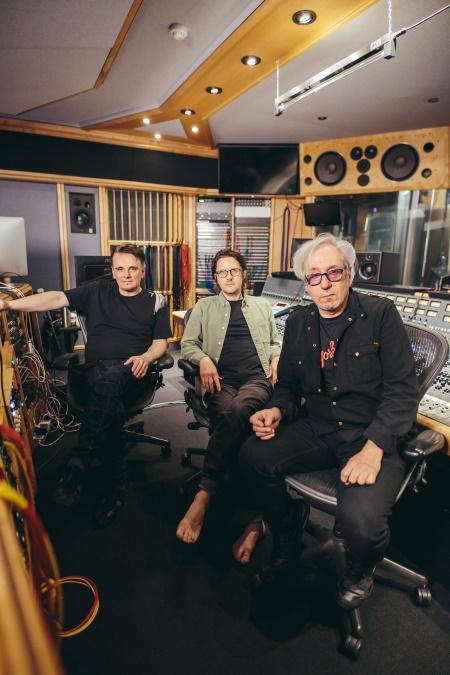 Porcupine Tree @ AIR Studios, London - photo: Adam Taylor
Porcupine Tree @ AIR Studios, London - photo: Adam Taylor
Innerviews has an in-depth interview with all three members of Porcupine Tree. Anil Prasad always gets to the bottom of things in his long-form pieces.
Steven Wilson about the band getting back together:
The first thing I want to point out here is that the band never officially dissolved. There was never any statement to the effect of, “The band no longer exists." Now, I say that with the caveat that obviously in interviews, I did try to get people to concentrate more on what I was doing at that moment, by being very dismissive about the band.
The material we are releasing on this new record goes as far back as 2012, which is when “Chimera’s Wreck” was written. So, there is a sense of continuity from the previous record, The Incident, which was released in 2009. We were writing material within three years of that album for a potential follow-up.
Obviously, that follow-up record has only just now come to fruition, but we were, on and off, working on this record for close to 10 years. So, in our minds, in our own little bubble, we had never stopped, but of course, to the outside world, it looked like the band had essentially ceased to function, when in fact it hadn't.
I think the COVID-19 lockdown definitely brought it into focus, because I'm not sure how long it would have taken us to actually get this record done, otherwise. A lot of the tours Gavin and I had scheduled for a couple of years got canceled. So, this record was one of the things we were finally able to do. We might have put it off indefinitely, otherwise.
There’s one section in “Harridan” where there's literally, within the same line of song vocal, a 10-year gap between the first half of the line and the conclusion of the same line of lyric. That blows my mind, because I can listen to it, and I actually hear the way my voice changed between 2012 and 2021. I don't think anyone else will notice, but I do, because I know where it is. So, it’s very strange for me to acknowledge what a long, extended, drawn-out process it was making the record. But there wasn't a time when we weren't planning to finish this record. There were years that went by when we didn't do anything at all to progress it even one step, but nevertheless, I think there was always the intention that we would ultimately finish and release it.
So, what I guess I’m saying is this really isn’t a reunion. I suppose it’s a public comeback. Whether it’s closure or continuation is something we’re going to decide at the end of the tour. Right now, we’re looking forward to the album release cycle and tour. I’m very excited about it. I can’t look beyond that.
Richard Barbieri on the upcoming tour:
We'll play the entirety of the album, but we're not going to play it as one piece. We're going to mix it up with a few surprises, but mainly material from the albums that we feel are the best that Porcupine Tree did, which are primarily In Absentia and Fear of a Blank Planet. So, it'll be a good two-and-a-half-hour set.
The hard work for me is the process of getting everything ready for it. When I'm up there on stage, there's nothing physical going on. It's easy for me. It's a case of having concentration and being able to execute all the ideas. So, I’m in the stage of getting gear and sounds together and working out how I can do this. I’m also determining what's possible and what isn't.
We’ve had pre-rehearsals with the new touring lineup. In late August, we start proper rehearsals. I think the music will come across well on stage. There will be some surprises. It’s what I’m concentrating on. I’ve put aside the year for this.
We are going to record every night of the tour. We might film one of the shows. There could be a documentary that gets made.
Gavin Harrison on jamming with Steven:
Sometimes we’d jam for 10-20 minutes with nothing interesting happening. We might start with a rhythm, guitar riff, or bass line to get us going. We would recognize when something interesting was happening and then maybe work on that idea for two or three days until we felt it had some possibility for moving forward with. There are lots and lots of demos we did where we said, "Yeah. It's nice, but we don't know where to go next with it. Put that on the hard drive. Forget that one." A few years later, we might listen back and go, "You know what, I've got another idea for this jam that we had a little while ago."
It was liberating to write in a different way than we ever did on previous Porcupine Tree records. You need a lot of trust in your writing partner. It's like you're exposing your inner soul. You're going to play some terrible mistakes along the way, and there are going to be some musical disasters. You need to feel comfortable with someone to have those as part of your process. You don't always want to show that side of yourself to someone you don't know very well. When you have that trust, you can both agree “This sounds really bad. Let’s never ever play this to anyone. Let’s try something else.”
So, it was a nice experience to write like that, and then bring in Richard, who contributes something very different. He’s not someone who jams. He’s a sound design expert. He brings something very unique and magical to the music. It’s something you would never think of when you’re writing from a pure bass, drums, and guitar point of view. He writes whole sections and pieces built around sound design. He doesn’t go, “Here are a bunch of chords on a Fender Rhodes.”
There were times where Richard would come ‘round to my studio and Steven would be there. We'd discuss the music and work on ideas. It was very laid back. We had no agenda and no time limit. We didn’t even have a record company for most of it. It was just like, "Well, let's just do it for the fun of it and see what happens." And eventually after all those years, we decided, “Let's try and finish this thing.”
To me, none of the new album sounds like anything we’ve done before. I recognize there's a sound that the three of us make, which people are always going to respond to by saying, "Oh, that sounds like Porcupine Tree." They probably hear something they don’t hear in Steven’s solo albums. The core of Steven, Richard, and I make something that sound like Porcupine Tree happen. It’s very hard to quantify.

